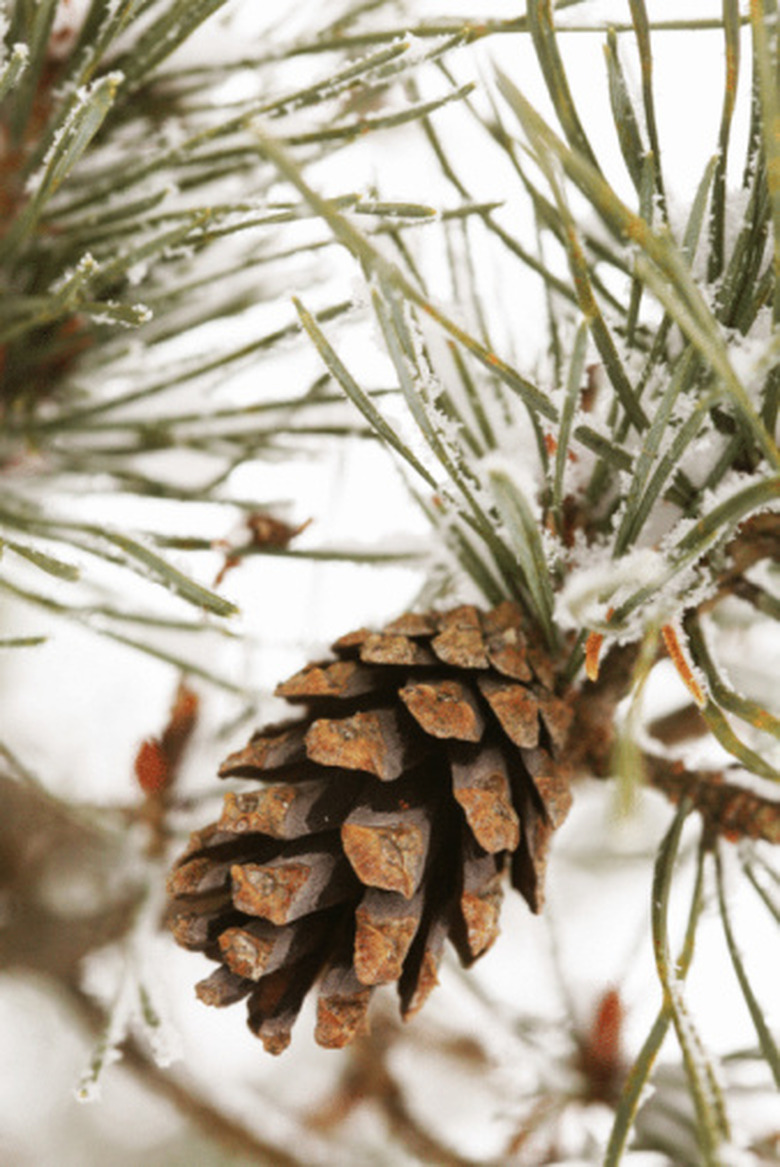Types And Species Of Cone-Bearing Trees
While cone-bearing trees, or conifers, all belong to the same plant group, they aren't actually all pine trees, nor are they all evergreens. The familiar Christmas tree might be what comes to mind when you think of cone-producing trees, but there are other types of trees that fit this description as well – and some of these trees are even deciduous. All cone-bearing trees belong to a group of plants known as gymnosperms, and conifers are the largest and most well-known subgroup of these.
Types of Conifer Trees
Types of Conifer Trees
Pine (Pinus spp.), spruce (Picea spp.) and fir (Abies spp.) are the largest groups of cone-bearing trees, and they are also the types of conifers most often grown at Christmas tree farms. Conical trees with evergreen needles, these trees may look very similar to a casual observer. However, there are many differences in their sizes, shapes and colors. Their cones are also different.
Examples of species of pine trees include the Scotch pine (Pinus sylvestris), Eastern white pine (P. strobus), Austrian pine (P. nigra) and sugar pine (P. lambertiana). While most produce pine cones just a few inches long, the cone of the sugar pine can grow up to 25 inches long.
There are several popular species of spruce trees for use in landscaping and Christmas tree production. These include Norway spruce (Picea abies), white spruce (P. glauca) and Colorado spruce (P. pungens), which is also known as blue spruce.
Fir species that are commonly grown in the United States include Frasier fir (Abies fraseri), noble fir (A. procera), white fir (A. concolor) and balsam fir (A. balsamea). Douglas fir (Pseudotsuga menziesii) is a misnomer, as this species actually belongs to the pine family.
Deciduous Cone-bearing Trees
Deciduous Cone-bearing Trees
There are several types of trees that have needle-like leaves which do not remain on the tree all year long. While most cone-bearing trees are evergreens, some are deciduous, which means that they lose their foliage during the winter.
Dawn redwood (Metasequoia glyptostroboides) can grow up to 100 feet tall, and its needles turn reddish-brown in the fall before they drop. Similarly, bald cypress (Taxodium distichum) – also known as swamp cypress – is a long-lived tree native to the southeastern United States that grows up to 120 feet tall and sheds its needles in the fall, after they turn from green to a yellow or copper color.
Trees that belong to the genus Larix – called the larches – are also deciduous conifers. American larch (Larix laricina), which is also called tamarack, eastern larch or red larch, is native to Canada and the northeastern United States. American larch has a flaky bark and produces small cones, and its needles turn a golden yellow color before dropping in the autumn.
Other Cone-producing Trees
Other Cone-producing Trees
Tsuga canadensis is commonly called Canadian hemlock or eastern hemlock, and it is a member of the pine family. Another native of North America, eastern hemlock is a long-lived evergreen tree with flattened needles and small cones. Western hemlock (T. heterophylla), which is also called western hemlock-spruce, is native to the west coast of the United States.
Redwoods (Sequoia sempervirens) and giant sequoia or giant redwood (Sequoiadendron giganteum) are evergreen trees that grow over 300 feet tall. Among the tallest species of trees in the world, both redwoods and sequoias belong to the Cypress family, Cupressaceae.
There are also species of cedars and junipers that produce cones. The needles of cedars are sometimes described as keeled, which means that they appear as though they are folded in. Junipers have two different needle shapes, and their cones are often referred to as berries, as they are fleshy rather than scaly, like typical cones.
Cite This Article
MLA
Sloane, Christina. "Types And Species Of Cone-Bearing Trees" sciencing.com, https://www.sciencing.com/types-and-species-of-cone-bearing-trees-12516590/. 30 September 2021.
APA
Sloane, Christina. (2021, September 30). Types And Species Of Cone-Bearing Trees. sciencing.com. Retrieved from https://www.sciencing.com/types-and-species-of-cone-bearing-trees-12516590/
Chicago
Sloane, Christina. Types And Species Of Cone-Bearing Trees last modified March 24, 2022. https://www.sciencing.com/types-and-species-of-cone-bearing-trees-12516590/
